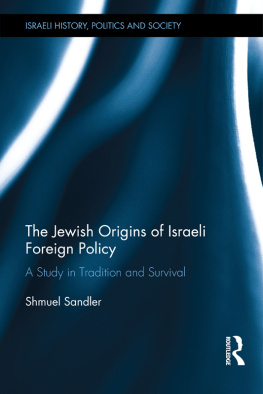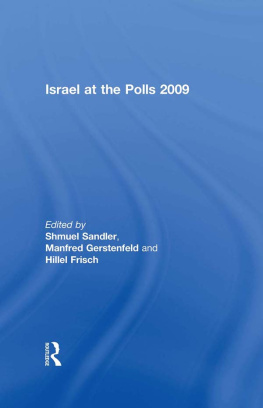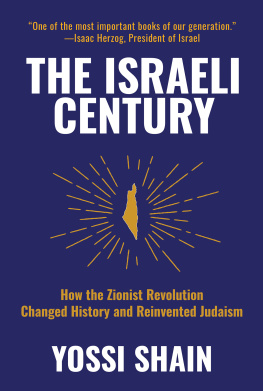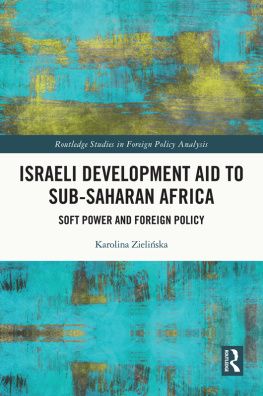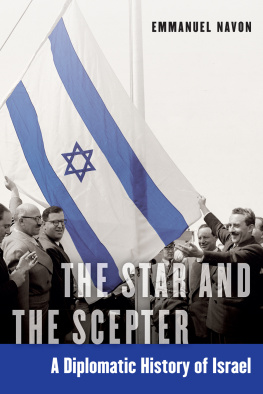The Jewish Origins of Israeli Foreign Policy
The conventional understanding of Israeli foreign policy has been that it is a relatively new phenomenon, with some claiming that the Jewish People is an invention by mid-nineteenth century Jewish historians, or simply an imagined community.
This book disputes these claims by demonstrating that the Jews have a tradition of foreign relations based on an historical political tradition that goes back thousands of years, and that this tradition has been carried over to the State of Israel. The Jewish political tradition in foreign policy has always been defensive-oriented, whether under sovereignty or in the Diaspora. Power has generally been only a means for achieving survival rather than a goal in itself, whereas Jewish national identity has always been related to historical Zion. In order to explore the question of whether it is possible to identify patterns of international behavior in the foreign policy of the Jews, the book begins with the Bible and continues through the period of the First and Second Temples, then looks at the long generations when the Jewish people were stateless, and ultimately concludes with an examination of the sovereign Jewish State of Israel. The underlying assumption is that an understanding of these characteristics will allow us to derive a better understanding of the Jewish origins of Israels foreign policy, which should in turn help to eliminate many of the harshest criticisms of Israels foreign policy.
By presenting a nuanced and intricate examination of longstanding Jewish foreign policy principles, this book will appeal to students and scholars of Jewish Studies, Israeli Studies, International Relations and anyone with an interest in the relationship between religion and foreign policy.
Shmuel Sandler is Professor of Political Science at Bar-Ilan University, and Senior Research Fellow at the BeginSadat Center for Strategic Studies. He also serves as the President of the Emunah-Efrata College in Jerusalem. His fields of research include domestic politics and foreign policy, ethnic politics and religion in IR, the ArabIsraeli conflict and Israeli foreign policy.
Israeli History, Politics and Society
Series Editor: Efraim Karsh
Kings College London
This series provides a multidisciplinary examination of all aspects of Israeli history, politics and society, and serves as a means of communication between the various communities interested in Israel: academics, policy-makers; practitioners; journalists and the informed public.
For a full list of titles in the series:
www.routledge.com/middleeaststudies/series/SE0790
| 53 | Politics of Memory
The Israeli Undergrounds
Struggle for Inclusion in the
National Pantheon and Military
Commemoralization
Udi Lebel | 58 | Ralph Bunche and the ArabIsraeli Conflict
Mediation and the UN,
19471949
Elad Ben-Dror |
| 54 | Moment in Palestine in the Arab/Israeli War of 1948
On the Israeli Home Front
Moshe Naor | 59 | Muslim/Arab Mediation and Conflict Resolution
Understanding Sulha
Doron Pely |
| 55 | Britains Moment in Palestine
Retrospect and Perspectives,
19171948
Michael J. Cohen | 60 | Antisemitism and Anti-Zionism in Turkey
From Ottoman Rule to AKP
Efrat Aviv |
| 56 | Israel and the Palestinian Refugee Issue
The Formulation of Policy,
19481956
Jacob Tovy | 61 | The Jewish Origins of Israeli Foreign Policy
A Study in Tradition and Survival
Shmuel Sandler |
| 57 | Jihad in Palestine
Political Islam and the
IsraeliPalestine Conflict
Shaul Bartal | 62 | Israel, the Arabs and Iran
International Relations and Status
Quo, 20112016
Ehud Eilam |
The Jewish Origins of Israeli
Foreign Policy
A Study in Tradition and Survival
Shmuel Sandler
First published 2018
by Routledge
2 Park Square, Milton Park, Abingdon, Oxon OX14 4RN
and by Routledge
711 Third Avenue, New York, NY 10017
Routledge is an imprint of the Taylor & Francis Group, an informa business
2018 Shmuel Sandler
The right of Shmuel Sandler to be identified as author of this work has been asserted by him in accordance with sections 77 and 78 of the Copyright, Designs and Patents Act 1988.
All rights reserved. No part of this book may be reprinted or reproduced or utilized in any form or by any electronic, mechanical, or other means, now known or hereafter invented, including photocopying and recording, or in any information storage or retrieval system, without permission in writing from the publishers.
Trademark notice: Product or corporate names may be trademarks or registered trademarks, and are used only for identification and explanation without intent to infringe.
British Library Cataloguing in Publication Data
A catalogue record for this book is available from the British Library
Library of Congress Cataloging in Publication Data
A catalog record for this book has been requested
ISBN: 978-1-138-72049-7 (hbk)
ISBN: 978-1-315-19499-8 (ebk)
Typeset in Times New Roman
by Wearset Ltd, Boldon, Tyne and Wear
To my wife Harriet (Channa) for all her support and encouragement throughout the process of developing and publishing this book.
This book was written while I served as the incumbent of the Yehuda Avner Chair in Religion and Politics at Bar-Ilan University. The Avner chair supported some of the funding of the editorial work that went into preparing this manuscript for publication. I met Yehuda when he joined as fellow at the Jerusalem Center for Public Affairs (JCPA) founded by the late Professor Daniel J. Elazar and now headed by Ambassador Dori Gold. I shared several manuscripts with Daniel Elazar and his thinking influenced one of the main themes of this book. I am sure that Ambassador Avner would have enjoyed reading this book but he passed away in 2015. An additional source was The Henry Taub Program in Democracy and Civics at Bar-Ilan which I also headed. I would like to thank my colleagues at the Begin-Sadat Center for Strategic Studies (BESA) with whom I shared some of the ideas presented in this study. Special thanks go to the Former Chair of BESA Professor Efraim Inbar and the current Chair Professor Efraim Karsh who encouraged me to submit the manuscript to Routledge. Special thanks also go to Routledge editor Emma Tyce for her patience and assistance, to Steven Moser, an intern at BESA, and to my editors Asher Weil and Marc I. Sherman for their patience and advice throughout this project. My wife Harriet (Channa) who did not let me give up writing this book deserves special recognition. My daughters Yehudit, Shlomit, Daniella, and Naama, and their husbands, gave up on hours of my attention to grandchildren that I should have given but did not. For sure, ultimately, the responsibility for this book is mine.
The Jewish people have been interacting with their external environment since they first appeared on the map of history. The central question that I wish to address in this book is whether it is possible to identify a Jewish political tradition in its interaction with surrounding nations. Or, to put it more directly, is there an inherent Jewish foreign policy? The subject matter against which this tradition will be evaluated is the foreign policy of the State of Israel. The theoretical perspective and discourse of such an interaction will be drawn from international politics and foreign policy, as well as from Jewish political studies.

